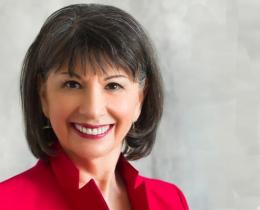Omega: A lot of leadership is about values, including how we value ourselves and each other. What values do women hold that align with strong leadership practices?
Gloria: Women are not actually inherently more nurturing than men. That said, the responsibilities of parenthood have traditionally fallen primarily on women. As a result, women have values and skills as parents that put them in good stead in today’s organizations. Use what you’ve got—that’s Power Tool #3 (one of nine total Power Tools that I've developed for women leaders). Take what’s seen as a liability and use it as an asset.
Nothing creates healthier and better lives for all people in organizations than a culture that values children enough to value the parenting skills of both genders. In fact, we should include parenthood on our resumes. Think about it: organization, juggling multiple high stress priorities, communication, negotiation, patience with diverse personalities, crisis management, developing innovative solutions to seemingly intractable problems—parents do it seven days a week.
Another asset women bring is valuing people as whole individuals whose lives include family and other interests, as well as workplace. This aligns with the leadership millennials are seeking.
Lastly, women have been socialized to be more risk averse than men. That’s why it’s asked—not always facetiously—if the 2008 financial meltdown would have occurred if Lehmann Brothers were Lehmann Sisters. We know that diversity around any table results in better decision making.
Omega: The “future of work” is changing rapidly, and women are leading the surge in small entrepreneurship and freelance in "the new economy." Is this a response to a desire for more work-life balance and flexibility, and to pay inequity? What do you think the future of more traditional work institutions—which have undervalued women and families—looks like?
Gloria: The good news is more women are starting businesses than ever in history. The bad news is twofold. First, many women are bailing out of existing organizations in order to have more flexibility and control over their lives or because they simply don't like the workplace culture. The danger here is that the workplace will not change because the people who could be the change agents are leaving. Second, female entrepreneurs get one venture capital dollar to every nine a man gets and starts her company with less than one-third the resources.
Because companies are in dire need of women—not only in leadership but also in technical positions—they’re changing policies. Young men want these changes as well. The millennial generation has higher expectations for personal development. They want to bring their whole selves to work, and to have flexible and sensible leave policies.
Here are two examples. A woman decided she’d gone as far she could at her company. Though the highest ranking woman, she didn't see a way up and negotiated a package to leave. When it became evident she was serious, the CEO offered her a higher position. She took it to advance herself and continue advancing other women in the organization, but is also giving thought to how to negotiate flexibility to work toward her goal of becoming an independent speaker and thought leader.
The second example taught me a phrase. In the midst of creating her Strategic Leadership Action Plan in my workshop, a woman said “I’m not sure if I want to have a W-2 position." This conceptualized the difference between defining your own work versus being in an organizational structure with less independence and flexibility—a job where you receive a W-2 tax form. My aspiration is for women to move seamlessly between these two modes in different phases of life without worrying about getting thrown off the career track, whether home with children or taking sabbatical to pursue a dream.
Omega: What are you most proud of Take The Lead achieving so far? What are you most hopeful of achieving this coming year?
Gloria: I’m very proud that we created an organization and movement that is impacting thousands of women in just three years—and we’ve done it on a shoestring! Our 2014 launch, with Carla Harris, Sheryl Sandberg, and others, reached 3,000 women in the auditorium and 500,000 over live stream to 48 countries. That told us there is a need and a hunger for this work. We’ve delivered learning programs, online and in person, for women across professional development. I've also trained 30 amazing and diverse women to be Leadership Ambassadors. Best of all, our evaluations find that up to 90% of the participants are acting on their Strategic Leadership Action Plans within a month of taking the course.
In the coming year, we intend to scale up training for corporations, entrepreneurs, nonprofit organizations, universities, and individual women. We’ll do more Take the Lead Presents role model events that inspire women to aim high with their intentions and host free Virtual Happy Hours in which I interview accomplished women. And we’ll be growing our free weekly newsletter on what’s happening in women’s leadership and women in the world.
Omega: Social media platforms, the users of which are mostly women, are changing the opportunities for women to organize and lift each other up. How do you see that shift impacting the work of Take The Lead?
Gloria: My Power Tool #8 is Employ Every Medium, because using the power of our voices as women is available to everyone free of charge. That is especially true with social media. We have the power to make a difference for ourselves and other women, but only if we actually use it. Power unused is power useless.
Though women were the most avid users of social media since its popularization, that use tended to be friendship and consumerism, whereas men were majority users of professional platforms, like LinkedIn. Now, women have become almost equal in the use of professional platforms. I think this reflects a greater personal intentionality and also a larger realization that only when women hold equal positions of leadership will we be able to solve the seemingly intractable problems of the world, such as sexual and domestic violence, human trafficking, and economic inequality.
Omega: The Omega Women's Leadership Center has launched a public awareness campaign #DoPowerDifferently. What does that phrase mean to you?
Gloria: The breakthrough to parity for women in leadership from the boardroom to the bedroom is to change the power paradigm, literally changing how we think about power from the oppressive “power over” to the expansive and creative “power TO.” Power TO is real leadership. So there is great alignment between Omega and Take The Lead on that front.
Join Gloria's self-study online course, Power to Lead, starting February 4, 2017.



